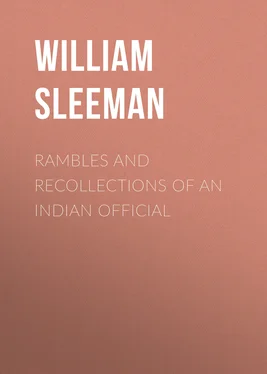William Sleeman - Rambles and Recollections of an Indian Official
Здесь есть возможность читать онлайн «William Sleeman - Rambles and Recollections of an Indian Official» — ознакомительный отрывок электронной книги совершенно бесплатно, а после прочтения отрывка купить полную версию. В некоторых случаях можно слушать аудио, скачать через торрент в формате fb2 и присутствует краткое содержание. Жанр: Путешествия и география, История, foreign_edu, foreign_antique, foreign_prose, на английском языке. Описание произведения, (предисловие) а так же отзывы посетителей доступны на портале библиотеки ЛибКат.
- Название:Rambles and Recollections of an Indian Official
- Автор:
- Жанр:
- Год:неизвестен
- ISBN:нет данных
- Рейтинг книги:4 / 5. Голосов: 1
-
Избранное:Добавить в избранное
- Отзывы:
-
Ваша оценка:
- 80
- 1
- 2
- 3
- 4
- 5
Rambles and Recollections of an Indian Official: краткое содержание, описание и аннотация
Предлагаем к чтению аннотацию, описание, краткое содержание или предисловие (зависит от того, что написал сам автор книги «Rambles and Recollections of an Indian Official»). Если вы не нашли необходимую информацию о книге — напишите в комментариях, мы постараемся отыскать её.
Rambles and Recollections of an Indian Official — читать онлайн ознакомительный отрывок
Ниже представлен текст книги, разбитый по страницам. Система сохранения места последней прочитанной страницы, позволяет с удобством читать онлайн бесплатно книгу «Rambles and Recollections of an Indian Official», без необходимости каждый раз заново искать на чём Вы остановились. Поставьте закладку, и сможете в любой момент перейти на страницу, на которой закончили чтение.
Интервал:
Закладка:
293
The barbarous habit of alliance and connivance with robber gangs is by no means confined to Rājpūt nobles and landholders. Men of all creeds and castes yield to the temptation and magistrates are sometimes startled to find that Honorary Magistrates, Members of District Boards, and others of apparently the highest respectability, are the abettors and secret organizers of robber bands. A modern example of this fact was discovered in the Meerut and Muzaffarnagar Districts of the United Provinces in 1890 and 1891. In this case the wealthy supporters of the banditti were Jāts and Muhammadans.
The unfortunate condition of Oudh previous to the annexation in 1856 is vividly described in the author's Journey through the Kingdom of Oude , published in 1858. The tour took place in 1849- 50. Some districts of the kingdom, especially Hardoī, are still tainted by the old lawlessness.
The remarks on the fine feelings of devotion shown by the sepoys must now be read in the light of the events of the Mutiny. Since that time the army has been reorganized, and depends on Oudh for its recruits much less than it did in the author's day.
294
Ujain (Ujjain, Oojeyn) is a very ancient city, on the river Sipra, in Mālwa, in the dominions of Sindhia, the chief of Gwālior.
295
Bhajpore in the author's text. The town referred to is Bhōjpur in the Shāhābād district of South Bihār.
296
Irrigation by means of a 'dug-out' canoe used as a lever is commonly practised in many parts of the country. The author gives a rough sketch, not worth reproduction. The Persian wheel is suitable for use in wide-mouthed wells. It may be described as a mill-wheel with buckets on the circumference, which are filled and emptied as the wheel revolves. It is worked by bullock-power acting on a rude cog-wheel.
297
December, 1835.
298
A.D. 1833 corresponds to the year 1890 of the Vikrama Samvat , or era, current in Bundēlkhand. About 1880 the editor found this great famine still remembered as that of the year '90.
299
Half a crown seems to be used in this passage as a synonym for the rupee, now (1914) worth a shilling and four pence.
300
Bundēlkhand seems to be the meeting-place of the east and west monsoons, and the moist current is, in consequence, often feeble and variable. The country suffered again from famine in 1861 and 1877, although not so severely as in 1833. In northern Bundēlkhand a canal from the Betwa river has been constructed, but is of only very limited use. The peculiarities of the soil and climate forbid the wide extension of irrigation. For the prevention of acute famine in this region the chief reliance must be on improved communications. The country has been opened up by the Indian Midland and other railways. In 1899-1900, notwithstanding improved communications, Mālwa suffered severely from famine. Aurangzēb considered Gujarāt to be 'the ornament and jewel of India' (Bilimoria, Letters of Aurungzebie , 1908, no. lxiv).
301
The influence of trees on climate is undoubted, but the author in this passage probably ascribes too much power to the groves of Mālwa. On the formation of the black soil see note 7 to Chapter 14, ante .
302
The word in the author's text is 'grain', a misprint for 'gram' (Cicer arietinum ), a pulse, also known as chick-pea, and very largely grown in Bundēlkhand. 'Gram' is a corruption of the Portuguese word for grain, and, like many other Portuguese words, has passed into the speech of Anglo-Indians. See Yule and Burnell, Glossary of Anglo-Indian Words , s.v.
303
'Agricultural capitalist' is a rather large phrase for the humble village money-lender, whose transactions are usually on a very small scale.
304
The author's advice on the subject of famine relief is weighty and perfectly sound. It is in accordance with the policy formulated by the Government of India in the Famine Relief Code, based on the Report of the Famine Commission which followed the terrible Madras famine of 1877.
305
This statement is too general. Examples of the horror alluded to are recorded in several Indian famines. Cases of cannibalism occurred during the Madras famine of 1877. But it is true that horrors of the kind are rare in India, and the author's praise of the patient resignation of the people is fully justified. An admirable summary of the history of Indian famines will be found in the articles 'Famines' and 'Food' in Balfour, Cyclopaedia , 3rd ed. (1885). For further and more recent information see I.G. (1907), vol. iii, chap. 10.
306
No European officer, military or civil, could now venture to adopt such arbitrary measures. In a Native State they might very probably be enforced.
307
'The magistrate' was the author himself.
308
The chief police officer of a town. In the modern reorganized system he always holds the rank of either Inspector or Sub-Inspector. Under native governments he was a more important official.
309
Elichpur (Īlichpur) is in Berār, otherwise known as the Assigned Districts, a territory made over in Lord Dalhousie's time to British administration in order to defray the cost of the armed force called the Hyderabad Contingent. Since 1903 Berār has ceased to be a separate province. It is now merely a Division attached to the Central Provinces. From the same date the Hyderabad Contingent lost its separate existence, being redistributed and merged in the Indian Army.
310
Political Economy was for many years a compulsory subject for the selected candidates for the Civil Service of India; but since 1892 its study has been optional.
311
The census of 1911 shows that about 71 per cent. of the 301,000,000 inhabiting India, excluding Burma, are supported by the cultivation of the soil and the care of cattle. The proportion varies widely in different provinces.
312
This proposition does not apply fully to Northern India at the present day. The amount of capital invested is small, although not quite so small as is stated in the text.
313
The times of harvest vary slightly with the latitude, being later towards the north. The cold-weather rains of December and January are variable and uncertain, and rarely last more than a few days. The spring crops depend largely on the heavy dews which occur daring the cold season.
314
Daring the years which have elapsed since the famine of 1833, great changes have taken place in India, and many of the author's remarks are only partially applicable to the present time. The great canals, above all, the wonderful Ganges Canal, have protected immense areas of Northern India from the possibility of absolute famine, and Southern India has also been to a considerable, though less, extent, protected by similar works. A few new staples, of which potatoes are the most important, have been introduced. The whole system of distribution has been revolutionized by the development of railways, metalled roads, wheeled vehicles, motors, telegraphs, and navigable canals. Carriage on the backs of animals, whether bullocks, camels, or donkeys, now plays a very subordinate part in the distribution of agricultural produce. Prices are, in great measure, dependent on the rates prevailing in Liverpool, Odessa, and Chicago. Food grains now stand ordinarily at prices which, in the author's time, would have been reckoned famine rates. The changes which have taken place in England are too familiar to need comment.
Читать дальшеИнтервал:
Закладка:
Похожие книги на «Rambles and Recollections of an Indian Official»
Представляем Вашему вниманию похожие книги на «Rambles and Recollections of an Indian Official» списком для выбора. Мы отобрали схожую по названию и смыслу литературу в надежде предоставить читателям больше вариантов отыскать новые, интересные, ещё непрочитанные произведения.
Обсуждение, отзывы о книге «Rambles and Recollections of an Indian Official» и просто собственные мнения читателей. Оставьте ваши комментарии, напишите, что Вы думаете о произведении, его смысле или главных героях. Укажите что конкретно понравилось, а что нет, и почему Вы так считаете.












